青少版新概念1BUnit22
【英语课件】1B-Unit 22 watching the neighbours 新概念英语青少版

again:又;再
Polly:Has she got ②a lot of friends
now,Annie? Annie:Well,she's very new here.And
she's shy.Perhaps she hasn't got
many friends.
new:刚来不久 Perhaps:或许; 可能
Polly:Well,there are ②lots of nice girls at the art college.
Annie:And Paul has got ②a lot of friends.He can ③introduce her to them.
Lesson 43
Word s
a lot of❊
很多
to
向
[ʃaɪ]
shy 害羞的
[ˈstʌdɪz]
studies 学习,研究
[ˈmenɪ]
many 很多
[truː]
true 真实的
[ˌɪntrəˈdjuːs]❊ introduce 介绍
[ˈɔːlweɪz]
always 总是dʒækɪt] [ˈvedʒtəbl] [ˌmæɡəˈziːn] [ˈrelətɪv]
a lot of:
(1)a lot of = lots of (2)表示许多 (3)后面接可数名词复数和不可 数名词 (4)some和any后面也可接可 数名词复数和不可数名词
many:可数名词复数 much:不可数名词 How many:可数名词复数 How much:不可数名词
✮Has she got a lot of friends now,Annie? ✮Perhaps she hasn't got many friends. ✮And Paul has got a lot of friends.
青少版新概念英语1bunit22

In addition, this unit also pays attention to the cultivation of students' cultural awareness and cross-cultural communication skills.
01
02
03
Analysis of Listening Skills
Some important words and expressions in this text include "pollution", "carbon footprint", "sustainable development", and "environmental protection".
It also emphasizes the role of government and businesses in promoting sustainable development and environmental protection.
Topic of the text
The text is organized in paragraphs, each dealing with a specific aspect of environmental protection.
The difficulty level of the listening materials is moderate, suitable for intermediate English learners.
Overview of Listening Materials
This unit mainly focuses on the development of students' listening comprehension skills, including understanding the main idea and details of the listening material, distinguishing facts from opinions, and making inferences based on the listening material.
青少版新概念英语1B Unit 22 教案

Unit22 Watching the neighbours 观察邻居们句型与结构词课文注释:题目:Watching the neighbors —当我们watch某人或某物的时候,我们“专注地看,期望能够了解什么东西”。
图1:again —通常放在动词短语的最后。
very good friends —在一般的陈述句中复数名词前面不加冠词。
其单数形式是a very good friend(那一类中的一个)。
图2:shy 通常表示赞许,用于形容那些在社交中不主动的人。
Perhaps —可与maybe互换使用;是在对话中轮流讲话时使用的非常有用的副词,用于提出建议或进行试探性的解释。
通常放在主语前面或动词短语的最后。
Many 在表示可获得/拥有等含义的肯定性陈述句中,即在与have got和there are连用时,a lot of更常使用。
在疑问句和否定陈述句中我们用many +可数名词。
图4:He can introduce her — can -表示“可能性”;introduce Claire/her —及物动词后跟名词或代词作直接宾语。
Introduce + 宾语+ to(介词)+名词或代词宾语。
*不是introduce them her。
图6:Paul’s always busy —此处always与现在时连用,表示“永久性真理”。
在陈述句中,always放在be的后面。
在疑问句中,它放在主语的后面:Is he always…?其它:一、have got1、当用于第三人称时,have got要变成has got。
肯定句:Kate has got lots of friends here. 凯特在这里有许多朋友。
否定句:Kate hasn’t got any friends here. 凯特在这里没有朋友。
一般疑问句:Has Kate got any friends here? 凯特这里有朋友吗?肯定回答:Yes, she has. 有。
新概念青少版1B Unit22
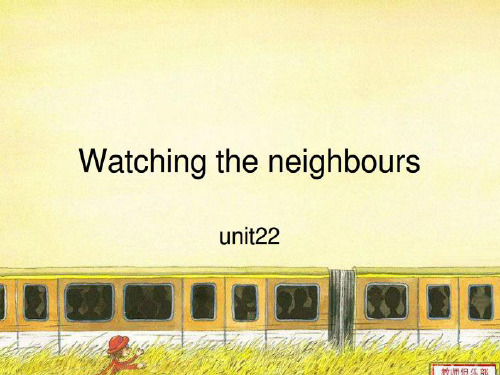
1
A: Have you got any coffee? B: Yes, I have.
We They You Karen and Paul
coffee tea
精选可编辑ppt
2
A: Has she got any beer? B: No, she hasn’t.
He She It Karen
名词的复数,也可以修饰不可数名词)
• e.g. There are lots of people in the park. There are lots of water in the river.
• 4. be with sb. 和某人在一起 e.g. He is in the garden with his father.
28
Polly: Well, there are lots of nice girls at the art college.
精选可编辑ppt
29
• Annie: And Paul has got a lot of friends. He can introduce her to them.
• Polly: Yes. Perhaps she’s happy with Paul. He’s a lovely young man.
the garden with his father.
精选可编辑ppt
36
变为一般疑问句
• 1.He has got many friends. • Has he got many friends? • 2.Paul has got lots of books. • Has Paul got lots of books?
青少版新概念1B_unit22(共21页)

He has not got lots of eggs. He hasn’t got lots of eggs.
他有很多鸡蛋吗?
Has he got many eggs?
a lot of, lots of, many与 much
a lot of = lots of 很多,后可接可数名词 与不可数名词
many 很多,后接可数名词复数 much 很多,后接不可数名词
他有很多书 He has got a lot of books. He has got lots of books. He has got many books.
她有很多CD She has got a lot of CDs. She has got lots of CDs. She has got many CDs.
如: boy, book, family等都是可数名词。
不可数名词
不可数名词主要包括两大类:物质名 词与抽象名词。物质名词表示无法为个体 的实物,如:食物、水、金属等,例如: rice, coffe, meat, bread, water, tea.抽象名 词为动作、状态、品质等无法计数的抽象 概念,例如:advice, knowledge, shame, heat.
Unit 22 Watching the neighbours
Lesson 43 Lesson 44
New Words and Expressions
breakfast blues 早餐忧郁How much? 多少---?
do 助动词
pot 壶
want 想要
start 开始
not really 不完全是,不太 morning 早晨
青少版新概念1B_unit22精品课件(共53页)
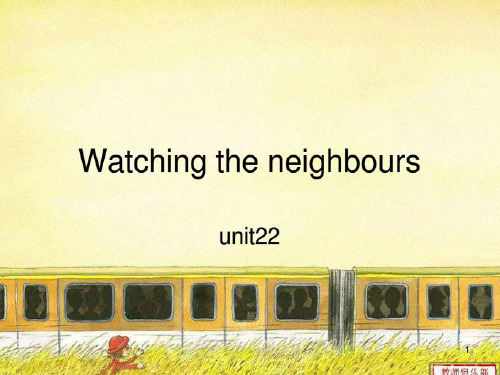
Is Claire busy? Is Paul busy?
Who are both busy?
Has Claire/ Paul got lots of spare time?
24
Who are they talking about? Who is Daisy?
25
听力理解
26
Listen to the recording, and then answer the question:
shy. Perhaps she hasn’t got many friends.
50
Polly: Well, there are lots of nice girls at the art college.
51
Homework
• 1. 新单词5英1汉 • 变一般疑问句,并做肯定和否定回答 • He has got lots of friends. • 2. 背诵课文1,2,3段 • 3.背诵笔记 • 4.预习右半部分课文。
41
做肯定和否定回答
• 1. Has Paul got any cake? • 肯定.回答; • Yes, he has. • 否定回答; • No, he hasn’t • 2. Has Claire got any food? • Yes, she has. No, she hasn’t.
42
27
Listen and fill in the blanks.
28
Polly: There’s Claire in Karen’s garden. Look, she’s with Paul again.
Annie: Yes, they’re very good friends.
青少版新概念1B_unit22(共25页)

PRACTICE
Has Paul got any apples? (同义句) Does Paul have any apples?
Has Robert got lots of shirts? (同义句) Does Robert have lots of shirts?
Have you got many books? (同义句) Do you have many books?
Annie: And they’re both very busy with their studies. They haven’t got a lot of spare time.
Polly: That’s true. Paul’s always busy. Now tell me about Claire’s mother…
真实的
always
总是
NEW WORDS AND EXPRESSIONS
a lot of a lot of = lots of 修饰名词,既可以是可数名词复数,也可以是
不可数名词 some也可以修饰名词,既可以是可数名词复
数,也可以是不可数名词,用于肯定居中 在否定和疑问句中用any
通常放在动词短语的最后。 在一般的陈述句中复数名词前面不加冠词,其
单数形式是a very good friend(一类中的一 个)。
LISTENING AND UNDERSTANDING
Polly: Has she got a lot of friends now, Annie?
Annie: Well, she’s very new here. And she’s shy. Perhaps she hasn’t got many friends.
新概念英语青少版1b课文Unit22:Watchingtheneighbours谈论邻居

新概念英语青少版1b课文Unit22:Watchingtheneighbours谈论邻居新概念英语青少版1b课文Unit 22:Watching theneighbours 谈论邻居新概念英语青少版Unit 22 Lesson 43:Watching the neighbours 谈论邻居Polly:There’s Claire in Karen’s garden. Look, she’s with Paul again.那是克莱尔在凯伦的花园里,看她又跟保罗在一起。
Polly: Has she got a lot of friends now, Annie?她现在有很多朋友了吗,安妮?Annie:Well, she’s very new here. And she’s shy. Perhaps she hasn’t got many friends.额,她在这里还是个新人,而且她还很害羞,可能她还没多少朋友呢。
Polly: Well, there are lots of nice girls at the art college.哦,艺术学校倒是有不好好女孩。
Annie: And Paul has got a lot of friends. He can introduce her to them.而且保罗有很多朋友,他能够把克莱尔介绍给他的朋友们。
Polly:Yes. Perhaps she’s happy with Paul. He is a lovely young man.是的,也许他跟保罗在一起很开心,保罗是一个可爱的年轻人。
Annie:And they’re both very busy with their studies. They haven’t got a lot of sp are time.而且他们俩都学习很刻苦,他们都没多少闲时间。
Polly:That’s true. Paul’s always busy. Now tell me about Claire’s mother.对,保罗很忙,现在跟我说说克莱尔妈妈的事吧。
青少版新概念_1B_Unit22
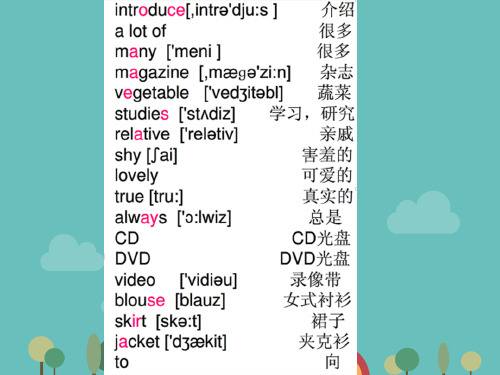
人
Chinese 中国人 German 德国人 Korean 韩国人 Swiss 瑞士人 British 英国人 Italian 意大利人 Japanese 日本人 French 法国人
Lesson 46 Pronunciation
Pronunciation /eə/ 从/e/音滑向/ə/音。发音时舌端抵下齿,前 舌略抬起,双唇半开。
明白了!
I know! I see!
我知道了!
n. 幸运
adj. 幸运的 lucky dog 幸运儿 Good luck!
luck lucky
another (三者以上的)另一个
some apples
another apple
birthday n. 生日 birth n. 出生 起源 day n. 天
For是介词, 表达原因和目
的
·动词want的单数第三人称用法: ·He/She wants…. ·He/She doesn’t want…. ·疑问式Does he/she want…? ·答句:Yes,he/she does.
No,he/she doesn`t.
William: She can give me the old one at any time! Just bring it here.
Switzerland['swɪtsələnd] 瑞士 Nationality: Swiss[swis]
It is from _____. It is _________.
She is from _F_ra_n_c_e__. She is _F_r_e_n_ch___._[f.rentʃ]
She is from _J_a_p_a_n_. She is _Ja_p_a_n_e_se_. [.dʒæpə'ni:z]
青少年新概念1B unit22 watching the neighbours
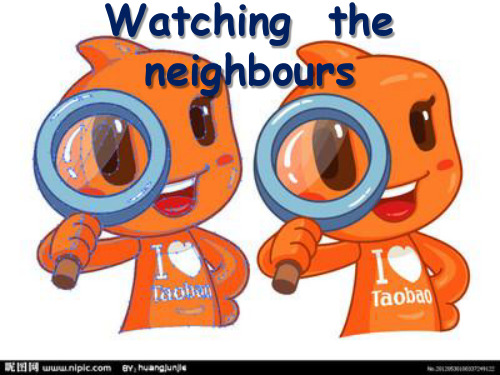
.introduce A to B 向B介绍A (A, B如果 是代词,要用代词宾格。)
• 6. has got 表示(某人)有 (用于主语单 三)
• e.g. He has got some juice. • 否定形式:hasn’t got 没有
• e.g. He hasn’t got any juice. • 一般疑问句:
Are the girls at the art collage or the sports academy?
Are they nice girls? Are they Claire’s friends?
Polly: Well, there are lots of nice girls at the art college.
Is Claire busy? Is Paul busy? Who are both busy? Has Claire/ Paul got lots of spare time?
ANNIE: And they are both very busy with their studies.
They haven’t got a lot of spare time.
magazine jacket
video
CD是音频唱片格式,
CD
DVD player
DVD是音视频影碟格式。 DVD机可以播放CD, CD机不能播放DVD。
relative
亲戚
Who are they? Who are good friends? Who do Polly and Annie talk about?
Who are they talking about? Who is Daisy?
新概念英语青少版1BUnit 22:Watching the neighbours
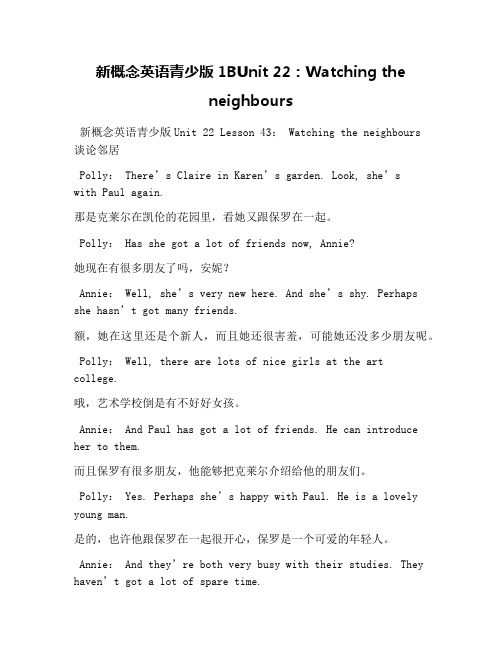
新概念英语青少版1BUnit 22:Watching theneighbours新概念英语青少版Unit 22 Lesson 43: Watching the neighbours 谈论邻居Polly:There’s Claire in Karen’s garden. Look, she’swith Paul again.那是克莱尔在凯伦的花园里,看她又跟保罗在一起。
Polly: Has she got a lot of friends now, Annie?她现在有很多朋友了吗,安妮?Annie:Well, she’s very new here. And she’s shy. Perhaps she hasn’t got many friends.额,她在这里还是个新人,而且她还很害羞,可能她还没多少朋友呢。
Polly: Well, there are lots of nice girls at the art college.哦,艺术学校倒是有不好好女孩。
Annie: And Paul has got a lot of friends. He can introduce her to them.而且保罗有很多朋友,他能够把克莱尔介绍给他的朋友们。
Polly:Yes. Perhaps she’s happy with Paul. He is a lovely young man.是的,也许他跟保罗在一起很开心,保罗是一个可爱的年轻人。
Annie:And they’re both very busy with their studies. They haven’t got a lot of spare time.而且他们俩都学习很刻苦,他们都没多少闲时间。
Polly:That’s true. Paul’s always busy. Now tell me about Claire’s mother.对,保罗很忙,现在跟我说说克莱尔妈妈的事吧。
新概念英语青少年版1B_unit22双数课(共18页).

haven’t或hasn’t. 1) I have got three sisters. → I haven't got three sisters. 2) He has got a bike. → He hasn't got a bike.
have got / has got 的定义及用法
• B :一般疑问句:把Have或Has提前到句首 1) I have got three sisters. → Have you got three sisters? Yes, I have./ No, I haven't. 2) He has got a bike. → Has he got a bike? Yes, he has./No, he hasn't.
Have got
• Have got 有,可使用 • Haven’t got 没有 • Have you got 有……吗? • 我们有一些苹果汁。 • We have got some apple juice. • 我们有橙汁吗? • Have we got any orange juice? • 我们没有橙汁。 • We haven’t got some orange juice.
• How many books has Paul got?
• Lots • How many CDs has
he got?ቤተ መጻሕፍቲ ባይዱ• Not many
What do you want for lunch ?
I want some cakes and some juice .
我们有多少? How much have we got ? 我们有多少果汁? How much juice have we got ? 我们有多少块蛋糕? How many cakes have we got ?
青少版新概念青一BUnit22 管敬霞

(一般疑问句和否定句) Paul has got some videos. Has Paul got any apples? Paul hasn’t got any apples. Karen has got lots of blouses. Has Karen got lots of blouses. Karen hasn’t got lots of blouses. We have got many magazines. Have you got many books? We haven’t got many books.
How much
• 你想要多少蛋糕? • How much cake do you want ?
• 保罗有多少书? • How many books has Paul got? • 他有多少CD? • How many CDs has he got?
Let's review.
have got 的用法
have got 表示有的意思,用于第一人称,第 二人称和第三人称复数。 变否定, have后加not have got a book. eg: I 1: 我有一本书。 Haven’t got 2 :你有一些咖啡。 I haven’t got a book. 3:我们有一些苹果。 变一般,将 4:你们有一些篮球。 Have you got a book? have提前, 5:他们有一些钱。 遇到第一变 第二
Are the girls at the art collage or the sports academy? Are they Claire’s friends?
Who has got lots of friends? Claire or his friends?
新概念英语青少版1B Unit22
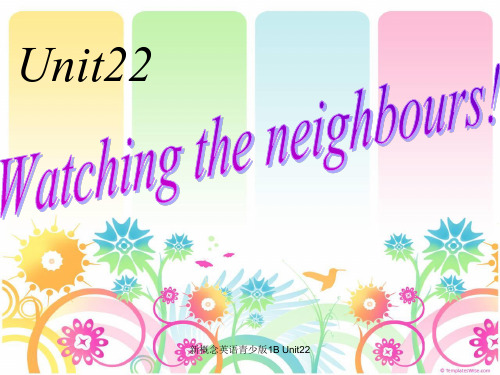
Questions:
• Have you got a lot of friends? • Who’s your best friend? • Tell me about your friend. Who’s always busy?
新概念青少版1B-DVDUnit22_Lesson43 高清.flv
Key points:
1)Has she/he got…. ?她/他有…吗? Have got… ?表示“有”
How many…have/has…got? 2)a lot of = lots of 很多,
后可接可数名词复数与不可数名词
many 很多,后接可数名词复数 much 很多,后接不可数名词
如果有两个或两个以上的名词作主语, be动词要和最靠近它的那个主语 在数上保持一致,也就是我们常说的 “就近原则”
There is an orange and some bananas
in the basket. There are some bananas and an orange
新概念in英语th青e少b版a1BskUenitt22.
2) with 和…在一起
Part 1 Claire and her good friend, Paul are in the Karen’s garden.
新概念英语青少版1B Unit22
Has she got a lot of friends?
新概念英语青少版1B Unit22
She’s very new here. She’s shy. Perhaps she hasn’t got many friends.
新概念英语rds and expressions:
新概念1B Unit22
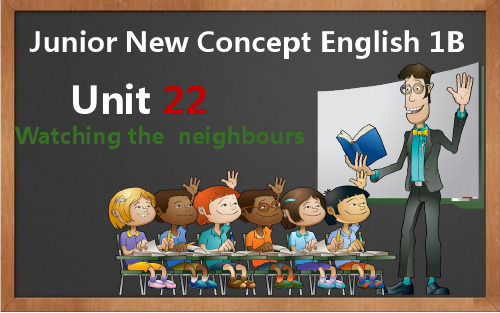
Paul: No, thanks. Have we got any tea?
Karen: Yes, there’s some tea in the pot.
Help yourself.
18
我是这方面的专家。 请相信我。
Karen: Poor Paul! It’s a very early start! Paul: Tell me about it! I can’t eat at six o’cloc in the morning.
2.Paul and Claire are good friends. It’s _t_r_u_e___ -they’re very good friends. 3.Can you _in_t_ro__d_u_c_e me to your new friend?
–Yes, of course. This is Peter.
fr_ _t ch_c_l_t_
b_ _r p_p_r str_ng m_n_y t_rr_bl_
礼貌表示拒绝的习惯用语。
Paul: Not really, but I must eat something. I mustn’t train on an empty stomach. Have we got any orange juice?
He’s a _l_o_ve_l_y_ __y_o_u_n_g_ man.
67
ANNIE: And they’re both very _b_u_s_y_ with
their _s_t_u_d_i_e_s_. They _h_a_v_e_n_’t_ got a lot of
_s_p_a_r_e_ time.
03 New words
- 1、下载文档前请自行甄别文档内容的完整性,平台不提供额外的编辑、内容补充、找答案等附加服务。
- 2、"仅部分预览"的文档,不可在线预览部分如存在完整性等问题,可反馈申请退款(可完整预览的文档不适用该条件!)。
- 3、如文档侵犯您的权益,请联系客服反馈,我们会尽快为您处理(人工客服工作时间:9:00-18:30)。
Picture 1
POLLY:There’s Claire in Karen’s garden. Look,she’s with Paul again. ANNIE:Yes.They’re very good friends.
There be 句型 某处有某物
Picture 2
POLLY:Has she got a lot of friends now,Annire? ANNIE:Well,she’s very new here. And she’s shy. Perhaps she hasn’t got many friends.
1.have:I、you、we、they 、名词复数 has:he、she、it、人名、名词单数 2.shy腼腆。形容某人不喜欢在社交活动中主动表现, 常有褒义。
Picture 3
POLLY: Well,there are lots of nice girls at the art college.
Susan 2013.11.1
New words
a lot of =lots of 许多 shy/ʃai/adj.害羞的 many/’mæ ni/很多 introduce/intrə’ dju:s/ sb./sth.to… v.+obj.+prep.向……介 绍某人/某物 to/tu:/prep.向 studies/’stʌdiz/pl.n. 学习 true/tru:/adj.真实的 always/’ ɔ:lweiz/adj. 总是
Picture 5
ANNIEith their studies. They haven’t got a lot of spare time. spare adj. 多余的
Picture 6
POLLY:That’s true.Paul’s always busy. Now tell me about Claire’s mother… Paul’s always busy.保罗总是很忙。陈 述句中always放在be动词之后,疑问 句中always放在主语之后。
lots of=a lot of 许多。用在肯定句中,修 饰可数名词复数和不可数名词。
Picture 4
ANNIE: And Paul has got a lot of friends. He can introduce her to them. POLLY:Yes.Perhaps she’s happy with Paul. He’s a lovely young man. He can introduce her to them.他可以把她介 绍给他们。 introduce+名词/代词+to+名词/代词,不能说 introduce them her.
1、听光碟。 2、完成书上练习P56T3、P57填词游戏。 3、过关放学。
Thank you!
